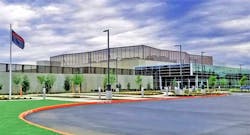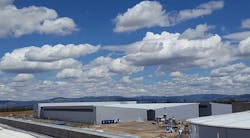Facebook Eyes Major Data Center Expansion in Hillsboro, Oregon
Facebook is pursuing a major expansion of its data center infrastructure in Oregon, prompting developer QTS Data Centers to seek more renewable energy for its campus in Hillsboro.
Oregon is home to Facebook’s first and largest data center campus in Prineville, a small town in Central Oregon, where the social network is building nine server farms spanning 4.6 million square feet of capacity. The proposed expansion would add multiple data center buildings in Hillsboro, a fast-growing cloud hub just outside Portland.
Facebook’s plans were described in a regulatory filing last week by Portland General Electric (PGE), the utility provider serving the QTS Hillsboro campus, which asked the Oregon Public Utility Commission to expand the Green Energy Tariff capacity. The joint filing by PGE and QTS seeks an additional 250 megawatts (MW) of renewable energy capacity to support the 92-acre QTS Hillsboro site.
“One QTS client, Facebook, is finalizing contracts to lease data center services from the fully expanded QTS campus in Hillsboro,” the filing says. “The 250 MW nameplate capacity request was developed using the projected load of the facilities that Facebook will lease from QTS under PGE Cost of Service tariffs.”
The exact scope of the Facebook lease in megawatts isn’t precisely clear, as data center operators typically provision more campus-level power than they will deliver to clients. But the proposed multi-building agreement would clearly be one of the largest wholesale capacity leases in the history of the data center industry.
QTS plans to deploy 200 megawatts of IT capacity at its Hillsboro campus, which currently features one 158,000 square foot building offering 85,000 square feet and 24 megawatts of leasable data center capacity. The applicants haven’t yet identified generation sources for the renewable energy, but PGE and QTS asked the utility commission to act on its petition within 90 days so its projects can move forward. A regulatory approval would be needed to expand the program beyond current caps. The filing was first reported by the Portland Business Journal.
Rapid Expansion Continues for Facebook
Facebook continues to expand its global IT infrastructure. Facebook’s data centers are deployed across 18 campus locations and will span 40 million square feet of data center space upon completion. along with 52 solar power arrays and 15 wind farms providing renewable energy to support its online operations, and 9 water conservation projects.
Over the past year, it has announced new data centers in Illinois and Tennessee, as well as major expansions of existing campuses in Utah, Georgia and Prineville, Oregon, where the company is rolling out a multi-story data center design featuring two floors of server rooms to boost capacity.
Facebook seeks large amounts of renewable energy to support the electricity used at each of its huge data center campuses. As an example, the company plans to procure 450 megawatts of new solar energy to support its new data center in Mesa, Arizona.
A Facebook cold storage data center, framed by the mountains of central Oregon. (Photo: Rich Miller)
Facebook builds most of its largest data center facilities, but also works with wholesale data center developers to deploy IT capacity in some markets, most notably in Northern Virginia, where Facebook has leased several buildings from providers. The proposed lease with QTS would provide growth capacity in Oregon, where Facebook has been operating since it opened its first company-built data center in Prineville in 2011.
But first, Facebook will need assurances that renewable capacity is available to support its expansion. Although data center builders are already the largest adopters of green energy, the recent storms and heat waves are prompting a renewed sense of purpose on climate from Facebook and other large users.
“A significant number of QTS’s potential co-location clients have identified climate change as one of the most urgent issues impacting the world today and thus are trying to do their part to minimize energy, emissions, and water impacts of their operations,” the filing said. “Obtaining an expedited Commission decision on this petition is the best path to inform QTS and Facebook on whether they can meet their business needs and corporate sustainability commitments.”
The utility filing notes that the additional renewable energy “will allow the QTS campus to add additional buildings to be served with renewable energy.”
QTS and Facebook said they will “consider and evaluate the possibility of energy storage associated with an eligible renewable resource.” A number of data center operators are considering incorporating energy storage into future facilities, which can enable solar and wind generation by allowing power to be stored for use when those sources aren’t available.
QTS Realty was recently acquired by Blackstone Infrastructure in a deal valued at about $10 billion.
About the Author




